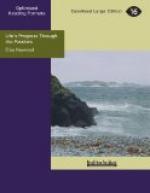Whoever has seen Rome will acknowledge he must find sufficient there to exercise all his faculties; but though the architecture, and the paintings which ornament that august city might have engrossed his whole attention, the many venerable reliques which were shewn him of old Rome, appeared yet more lovely in his eyes; which shews the charms antiquity has for persons even of the most gay dispositions: but this, according to my opinion, is greatly owing to the prejudice of education, which forces us as it were to an admiration of the antients, meerly because they are so, and not that they are in any essential respect always deserving that vast preference given them over the moderns:—this may be easily proved by the exorbitant prices some of our virtuoso’s give for pieces of old copper, which are reckoned the most valuable, as the inscriptions or figures on them are least legible.
Natura, however, was not so absorbed in his admiration of the ruined corner of a bath, or the half-demolished portico of an amphitheatre, as to neglect those entertainments which more affect the senses, and consequently give the most natural delight;—the exquisite music performed at the churches, carried him there much oftener than devotion would have done, and rarely did he fail the opera at night.
As the Romans are allowed to be the best bred people upon earth, especially to strangers, be they of what country or perswasion soever, neither the being an Englishman or a Protestant hindered him from making very good acquaintance, and receiving the greatest civilities from them; but the person to whom he was most obliged, and who indeed had taken a particular fancy to him, was the younger son of the family of Caranna: this nobleman, knowing his taste for music, would frequently take him with him to his box at the opera-house, most persons of condition having little closets or boxes to themselves, of which every one keeps his own key, and none can be admitted but by it:—nothing can be more indulging, as there are curtains to draw before them, and the seats are made in such a manner that the person may lie down at his ease.
The signior of Caranna being otherwise engaged one night, when a celebrated piece was to be performed, he lent his key to Natura, unknowing that his wife, who had also one, had made a compliment of her’s to a young lady of her acquaintance.
Natura by some accident being delayed from going till after the opera began, on entering was surprized to find a very beautiful young person there, stretched on the sopha:—as he had been told the box would be intirely empty, he knew not whether he ought to retire or go forward and seat himself by her:—this consideration kept him some minutes in the posture he was in, and perceiving she was too much taken up with the music, either to have heard him open the door, or see him after he came in, he had the opportunity of feasting his eyes, with gazing on the thousand charms she was mistress of; all which were displayed to a great advantage by the shadowy light which gleamed from the stage thro’ a thin crimson taffety curtain, which she had drawn before her, to the end she might neither be seen by others, nor see any thing herself which might take off her attention from the music.




